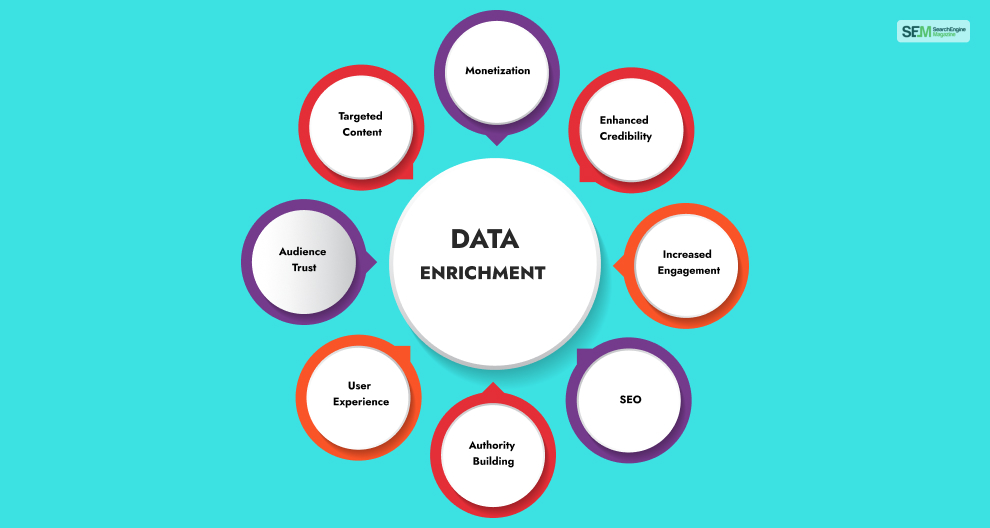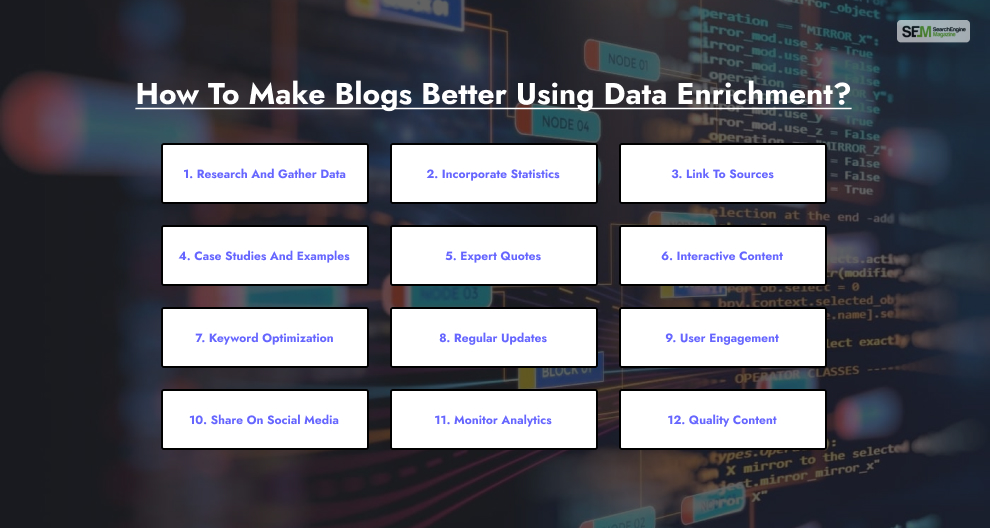How To Know If Someone Blocked You On iMessage? 5 Secret Hacks!
Apr 16, 2025

Apr 16, 2025

Apr 16, 2025

Apr 15, 2025

Apr 11, 2025

Apr 11, 2025

Apr 11, 2025

Apr 08, 2025

Mar 29, 2025
Sorry, but nothing matched your search "". Please try again with some different keywords.


Data enrichment is the process of enhancing or improving a dataset by adding additional information, details, or context. This typically involves supplementing existing data with external sources, correcting errors, standardizing formats, and enhancing its overall quality and usefulness.
It aims to provide more comprehensive, accurate, and valuable information for analysis, decision-making, and various applications.
But how can you use this in blogging to improve your content and website? Does it really help?
Read this post until the end to learn about its benefits for blogging and how to incorporate it into your SEO and content marketing strategy!

If you have a look at HubSpot Data Enrichment, you will understand how it offers several significant benefits in blogging. Here are some of the primary benefits of data enrichment services for bloggers:
Your blog gains credibility by providing accurate data and statistics from reputable sources. Readers are more likely to trust your content when it’s backed by reliable information.
Citing sources and linking to them shows transparency and a commitment to providing accurate information.
Data-rich content tends to be more engaging. Statistics and charts can break up text, making it visually appealing and easier to digest.
Readers are more likely to share content that includes valuable data, which can increase your blog’s reach and impact.
Search engines value high-quality content that provides value to users. Data enrichment can enhance your content’s quality, positively impacting your SEO efforts.
Keyword optimization within data-driven content can help you rank higher for relevant search queries. Also, good knowledge of technical SEO and on-page and off-page SEO will help you out here.
Regularly publishing well-researched and data-enriched blog posts can establish you as an authority in your niche or industry.
Over time, your blog may become a go-to resource for people seeking reliable information, further enhancing your credibility. This is why brand authority is one of the most important metrics businesses should look into.
Data enrichment can make your content more informative and insightful, leading to a better user experience.
Readers are more likely to stay on your blog, engage with your content, and return for future articles if they find valuable data.
When readers consistently find valuable, data-backed insights in your blogs, they are more likely to become loyal followers and subscribers.
Trust and loyalty can lead to higher user engagement, more shares, and a dedicated readership.
In competitive blogging niches, data enrichment can set your content apart. It demonstrates that you invest time and effort in providing valuable information.
If your competitors need to utilize data enrichment, it can give you a unique selling point.
Customer data enrichment can help you understand your audience better. By analyzing data, you can tailor your content to address your target audience’s specific pain points or interests.
High-quality, data-enriched content can attract advertisers or sponsors looking to align with authoritative blogs.
It can also open up opportunities for affiliate marketing or partnerships with data providers in your niche.
Data-enriched content often has a longer shelf life because it remains relevant for an extended period. Evergreen content with valuable data can continue to drive traffic and engagement over time.

Using data enrichment tools effectively in your blogs can enhance their quality and improve their ranking. Here’s how you can do it:
Before writing your blog, conduct thorough research to find relevant statistics, facts, and data related to your topic. Use reliable sources, studies, and reports.
Integrate relevant statistics and data points into your blog content. Ensure they support your arguments or claims. Use charts, graphs, or infographics to present data when appropriate visually.
Provide citations and links to the sources of your data. This adds credibility to your blog and allows readers to verify the information.
Include real-world case studies or examples that illustrate the points you’re making. This adds depth and practicality to your content.
Incorporate quotes or insights from industry experts or authorities on the subject. This adds authority to your content and can make it more trustworthy.
Create interactive content like quizzes or surveys that collect data from your readers. This can engage your audience and generate valuable user-generated data.
Use data-driven keywords and phrases in your content to improve SEO. An SEO consultant or SEO freelancer can help in identifying high-value keywords related to your topic using keyword research SEO API tools like Semrush alternatives.
Keep your data up-to-date. Outdated information can harm your credibility. Mention the publication date of the data you use and update your content as needed.
Encourage readers to engage with your content by sharing their thoughts, opinions, or data in the comments section. Respond to comments and foster discussions. If you master online engagement, data enrichment will go a long way to make it worthwhile.
Promote your data-rich blogs on social media platforms to reach a wider audience and encourage sharing. Social signals can indirectly impact your ranking. Learning how to use Pinterest for blogging can help you out over here.
Use web analytics tools to track the performance of your blogs. Monitor how users interact with your data-enriched content and adjust your strategy accordingly.
Remember that a data enrichment agent should enhance the quality of your content, not overwhelm it. Maintain a balance between data and readability.
Data enrichment in blogging elevates the quality and credibility of your content and fosters reader engagement, trust, and loyalty. Over time, these benefits can improve SEO, authority, and monetization opportunities, making it a valuable strategy for bloggers looking to excel in their niche.
By incorporating data enrichment techniques into your blogging strategy, you can create more informative, engaging, and SEO-friendly content, improving your chances of ranking higher in search engine results pages (SERPs) and attracting a larger audience.
If you wish to learn more, comment your questions down below!
Also Read
Mashum Mollah is the feature writer of SEM and an SEO Analyst at iDream Agency. Over the last 3 years, He has successfully developed and implemented online marketing, SEO, and conversion campaigns for 50+ businesses of all sizes. He is the co-founder of SMM.
View all Posts
How To Know If Someone Blocked You On iMessag...
Apr 16, 2025
7 Website Design Mistakes That Are Hurting Yo...
Apr 16, 2025
Programmable Dynamic SEO for Location-Based P...
Apr 15, 2025
Google Boba Game: How To Play This Fun Game B...
Apr 11, 2025
Which Is The Best Video Search Engine Of 2025...
Apr 11, 2025

